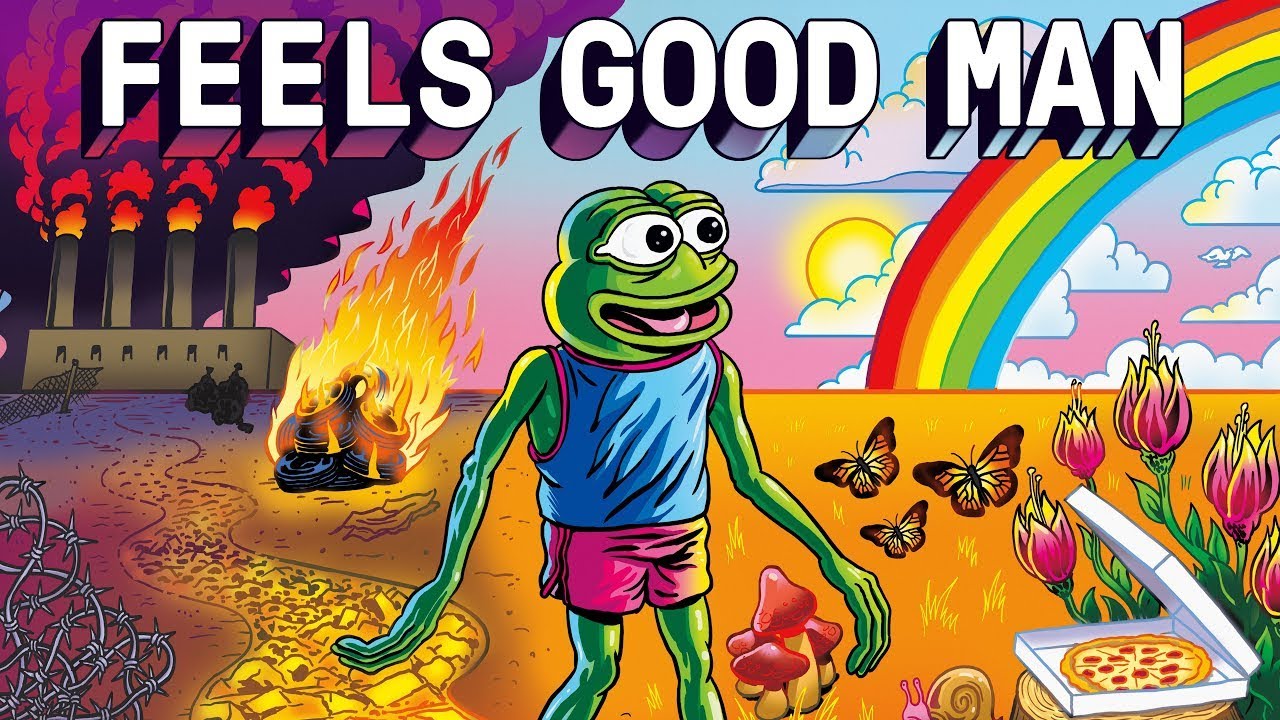If you’ve ever seen a meme before, it’s more than likely you’ve also seen Pepe – the ubiquitous cartoon frog which, more than any other image on the internet, has come to represent the obscene, irony-laden aesthetic of twenty-first century fascism.
A new documentary tracks this amphibian’s unlikely descent from beloved indie comic book creation to internationally recognised hate-symbol of Trump-supporting neo-Nazis.
Feels Good Man takes its name from a strip in the indie comic book series Boy’s Club, which depicts Pepe using the phrase to explain why he urinates with his trousers pulled all the way down to his ankles. “That was the frame that started it all,” says Matt Furie’s partner with a wry smile. The catchphrase starts appearing on MySpace fitness forums as a way for men to “jokingly reclaim their loserdom”, but Pepe takes on a much darker valence once he reaches 4Chan, the anonymous message board accused of abetting the surge of white supremacism in the last decade.
The documentary contextualises Pepe’s co-optation with incisive cultural analysis, providing a chilling account of internet-induced alienation. Yet the plot’s real poignancy is produced by the efforts of Pepe’s creator, the affable but somewhat guileless San Francisco cartoonist Matt Furie, to reclaim his art as a force for good. Furie’s tragic predicament underscores the difficulty of insulating art – along with everything else we cherish – from the all-pervading cynicism of the digital age.
To celebrate its UK release on BBC iPlayer, the Quietus spoke to Feels Good Man producer, Giorgio Angelini, about the broader cultural significance of Pepe, the occult nature of memes and online conspiracies, and the use of animation to evoke a luckless croaker’s quest for redemption.
How did Pepe first come to your attention?
The film’s director, Arthur Jones, is an animator and a fan of indie comics, so he was familiar with Boy’s Club and Pepe before it became this meme. He and Matt [Furie] became friends on a camping trip organised by a mutual friend, and for a while they were trying to pitch this animated series based off of Boy’s Club. But whenever they would enter pitch rooms, the only thing anyone ever wanted to talk about was Pepe’s co-option by the far-right. That was in 2015 or 2016 which is when Matt. who is not a very online person. started to realise that this was perhaps a bigger deal than he had anticipated. It started weighing on his soul. Arthur saw this opportunity to tell a really important story but also to help his friend out.
I had worked with Arthur before before and he asked me if I wanted to help him make this documentary about Pepe. I felt embarrassed because I was familiar with Pepe but only as a meme, I didn’t know anything about his backstory. As soon as he started telling me about Matt and Boy’s Club, my mind started racing with ideas about the potential for this film to speak to our cultural moment, not just Matt’s personal story, but also what it portended for all of us.
The film is interspersed with beautiful animated sequences which helps bring the subject matter to life. How did you go about creating the animation?
Arthur is an animator by background and I came to documentaries through architecture and design so I’m also interested in these things. We understood that this documentary offered an opportunity to bring Boy’s Club to life through animations and in a sense, canonise Pepe – that felt really important. I think the reason Pepe had this experience was because most people didn’t understand where he came from and so the internet was able to create its own narrative. We wanted the animations to establish a context so that at least moving forward, people would understand his origins. We didn’t know exactly how we were going to do that but we quickly understood that if the animations were going to work, they almost had to be reduced to their bare essence, so that they became almost like the memes.
We also wanted viewers to develop an emotional connection with Pepe’s character so that when you see him at the end of the film, it’s hopefully a very moving moment where all the emotions of this internet experience are transmuting into his eyes and into his breathing. Functionally speaking, Arthur and I put together this incredible team of animators who really understood the opportunity that the story afforded us and really threw themselves into the project with a deep sense of creative artistry. We’re super proud of how it turned out, especially considering the meagre budget we had to put it together.
Can you briefly explain how Pepe goes from being this obscure but well-loved comic book character to a viral internet meme, and eventually the poster-child for the fascist alt-right and Donald Trump?
It seems like a crazy journey, but actually there’s a pretty clear path. It starts when Pepe becomes this icon for a particular group of young, predominantly white males who are creating early internet culture on forums like 4Chan and Reddit, which at the time were somewhat insulated from the rest of the world. As social media becomes more popular through sites like Tumblr and Facebook, more people become aware of Pepe as this cute character and start using the meme.
This causes the early Pepe adopters organise this punk-like response, where in order to resist what they call the “normie invasion” of sites like 4Chan, they make Pepe as unpalatable as possible and this is when you see the ‘Nazification’ of Pepe on these forums. That sets into motion this troubling chain of events which intersects with the rise of Donald Trump in 2016. And 2016 is itself this really important moment where the digital world inverts itself into our everyday lived realities. Trolling becomes mainstream and Pepe becomes the icon for it, to the extent that Donald Trump retweets himself as Pepe during the election. Trump used Pepe as a kind of frog-whistle – instead of a dog whistle – to signal to these alienated men that he shares their resentment towards women, immigrants, Muslims, POC and other minorities. You also have the professional racists who see an opportunity to ingratiate themselves with this nascent far-right movement. Richard Spencer wears Pepe as a pin on his lapel, neo-Nazi websites use it and they too are cynically appealing to this group of alienated online men.
So it’s this really treacherous and horrific confluence of events in 2015 and 2016 which cements Pepe’s reputation as a hate-symbol.
How do you think Matt Furie copes with his creation being appropriated for evil?
Matt was thrust into a situation where he had to get up off his proverbial couch and do something. He has this really traumatic experience, particularly in 2015 and 2016, where the intense association with Pepe and the alt-right meant that lots of people were putting Matt and them in the same box – some people actually accused Matt of being a white supremacist himself, which was obviously really traumatising. So we hoped that the film would be an empowering opportunity for Matt to address this stuff head on rather than wallow in the darkness of it all.
Coming out the other end and seeing what happened in Hong Kong (where Pepe was used as a symbol of resistance against an authoritarian state) was very rewarding for Matt. It affirmed what he’s always said, that Pepe isn’t a hate symbol – it’s a symbol of love. Seeing the film premiere at Sundance was incredibly emotional for him, and the outpouring of love and support that has accompanied the film’s release has helped him reassess his relationship with Pepe as a character in a very positive way.
Another theme I took, for which Matt is perhaps the perfect avatar, is the question of whether it remains possible to protect oneself from internet toxicity, particularly if you’re using it to make art.
Yeah, for me the film was very much a reaffirmation of consensus reality – the idea that we can push back against this commoditised mode of the internet and social media, which has kind of shamed us out of our capacity for empathy and understanding. It has turned us into these cynical, nihilistic ghouls who troll each other for fake internet points. But it doesn’t have to be that way, you don’t have to feel shame for giving a shit about your fellow person who is just trying to get by.
At the end of the film Matt has this line about trying to be “hardcore happy”, which on its face might come across as pithy or hippie-dippie. But in the wake of his story, I think he says this with a tinge of pain in his heart, which to me was profound, because it’s as if he’s saying: you do have some agency in the way you engage online. Of course depression is a very real thing, but there are choices that you make in your life. To be constantly online trapped in these horrible feedback loops – that’s a decision you’re making. But you can also make the decision to surround yourself with friends or be prosocial instead of anti-social, and do positive things that might at least put you on a path towards some sense of happiness and well being.
One of the people you interview is the occultist writer John Michael Greer, who talks about memes as a form of magic. What does he mean by that in relation to Pepe?
John was one of the last people we spoke to after two years of interviewing psychologists, journalists and kids online, but it took an occultist to explain what this film was actually about. We had to film the interview at night because John is a nocturnal thinker and when you Google John, the first photo that comes up is him dressed as an Archdruid. So it’s easy to laugh at his image, but he’s actually a deep intellectual who is taking this stuff very seriously.
John’s position is that magic is the tool of the unheard, a tool of the masses. People who feel they are without power focus their energies on signs and symbols and they try to manifest things collectively through a shared focus of energy. And in a way, internet memes put this ideology into practice. That’s certainly the way Donald Trump has been using memes. It’s a way to democratise propaganda and a way, if we’re being generous, to democratise politics, because it upends the relationship between the politician and electorate. All of a sudden, Joe Schmo behind the computer can participate actively in a campaign, which I think is in some sense, really good. But of course, when you combine that with propaganda and this idea of meme magic, it becomes a dangerous mix.
There’s a great deal of concern right now about the damage wrought by a decade of social media use, also evidenced by the Netflix documentary The Social Dilemma. Part of this panic concerns the mainstreaming of conspiracy theories like QAnon. Do you see QAnon as a continuation of the same online trends your film explores?
Absolutely. QAnon is definitely a continuation of the Pepe story because it’s another consequence of this hyper-democratisation. The internet has democratised things to the point that people get to create their own narratives, and then politicians are just kind of chasing these constituencies who have moved online where they’re completely untethered from policy. And it becomes purely about emotional attachment.
I think the problem we now face with the power of memes is that they’re a linguistic set based entirely in image, and the same image can mean a million different things to a million different people, but it can reverberate emotionally in an incredibly profound way. This is a very dangerous way of forming political constituencies and I think it portends something very worrying about democracy moving forward.
If you look at senior figures in the Republican Party, people like the Senate leader Mitch McConnell, they’re delighted by this transformation because they no longer have to participate in traditional politics through presenting the public with their actual policy ideas. They can simply pay lip service to QAnon and they get this very motivated, very angry mass that will go out and support them. They can effectively run for office without promising to deliver any material improvements on people’s lives. I mean, you look at the response from Trump supporters to him personally getting COVID-19, and it’s effectively a cult at this point.
Feels Good Man is available to watch on BBC iPlayer now




